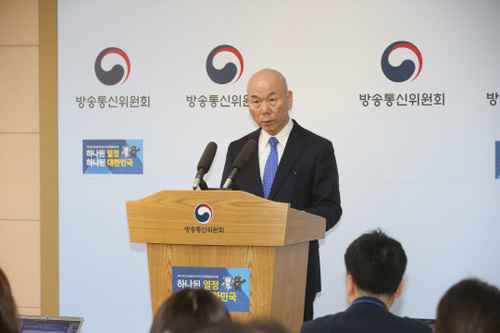Korea Communication Commission to discuss charging network usage fee of Google & ground wave middle advertising introduction
Kang Eun Seong | esther@ | 2017-12-07 10:09:49

The Korea Communications Commission (KCC), on December 6, held a general meeting at the Gwacheon Government Complex, and the 4th KCC discussed the major policy directions and detailed projects for the next three years. The Korea Communications Commission (KCC) has selected four major goals: △ to create a fair and free environment for broadcasting and communication, △ to strengthen active participation and rights of users, △ to build a broadcasting ecosystem capable of sustainable growth, and △ to activate new industries for the future.
In order to achieve this goal, the ten major initiatives are to strengthen the fairness and publicity of broadcasting, to enhance the diversity and locality of media, to strengthen the freedom of expression of the Internet and to improve the response to dysfunctions, to strengthen the media capacity and participation of users, Enhancement of unfair competition and establishment of win-win environment △ establishment of high-quality contents production base for broadcasting Korean wave △ improvement of imbalance of regulation among media △ activation of new broadcasting communication service and system improvement △ harmonization of personal information protection and fourth industrial revolution support policy is about to set.
Lee Hyo-seong pointed out in a press briefing after the meeting, "We will focus on restoring the fairness of the broadcasting, improving the use environment, resolving the issue of internet station discrimination, deregulation, and strengthening personal information protection."
◇ Google - Youtube, "Network users," Mr. Lee said and showed considerable commitment to the deregulation of the Internet industry and the elimination of discrimination. "If overseas internet operators can not regulate the same, it is a principle that only domestic operators do not enforce regulations that are likely to be discriminated against," he said.
Previously, the National Assembly initiated the `New Normal Act` which includes the contents of collecting the broadcasting and communication development fund, saying that it intends to strengthen the `social duty` of the large portal. In addition, portal editions such as news editors can distort public opinion, and various laws are regulated to regulate them.
Mr. Lee also said, "Basically, it is not going to be an asymmetric regulation, in which only domestic companies are regulated because foreign companies are not covered by the law." However, he said, "We will actively respond to the problem of reverse discrimination." Actual overseas social media service (SNS) company tumbler, such as pornography without leaving the filtration of the parts of the cause of the `reverse discrimination` to prevent the stipulation that the Korea Communications Commission is the policy. "The 4th KCC has included the guarantee of freedom of expression on the Internet as one of the top ten projects," he said. "But it does not mean that it will help to provide content that contains pornography or copyright infringement content.”
Google - YouTube, which accounts for the vast majority of domestic video traffic, is also interested in getting network users. If the FCC decides to dismantle the network neutrality on the 14th, the Korea Communications Commission could accept it and allow telecom operators to charge extra for excessive traffic. On this day, Chairman Lee said, "I think that internet operators who charge excessive traffic should pay a fair net fee, and I think it is necessary to mitigate some of the net neutrality." However, In the quality network guaranteed for the rights, the essential neutrality of transmitting content without discrimination in accordance with the principle of neutrality must be maintained. "
◇ Discussions on the introduction of terrestrial interim advertising = The Korea Communications Commission (KCC) has revised the system for new type convergence services such as Internet TV (OTT) and video on demand (VOD) Will improve the competitive situation of broadcasting market. In particular, it announced that it will completely overhaul the broadcasting advertising system. At the present time, he showed that it is possible to allow interim advertising of strictly prohibited terrestrial broadcasting. Currently, seven broadcasting ad regulatory systems will be simplified to two, and plans will be made to improve the overall system of broadcasting adverts, such as improving the format regulation within the year.
Meanwhile, Mr. Lee also said, "We already have mid-range advertisements for general and pay-TV broadcasts, but the issue of introducing terrestrial broadcasting is still a bit opposed by civic groups," he said. "But it is time to rethink fundamentally as the broadcasting environment changes. "He said. "It is hard to think dichotomically because terrestrial broadcasters cannot be paid for (interim advertising) and paid broadcasting," he said. "Considering the changes in the situation, I will prepare a little more aggressive measures to deal with this problem.”
By Kang Eun Seong esther@
